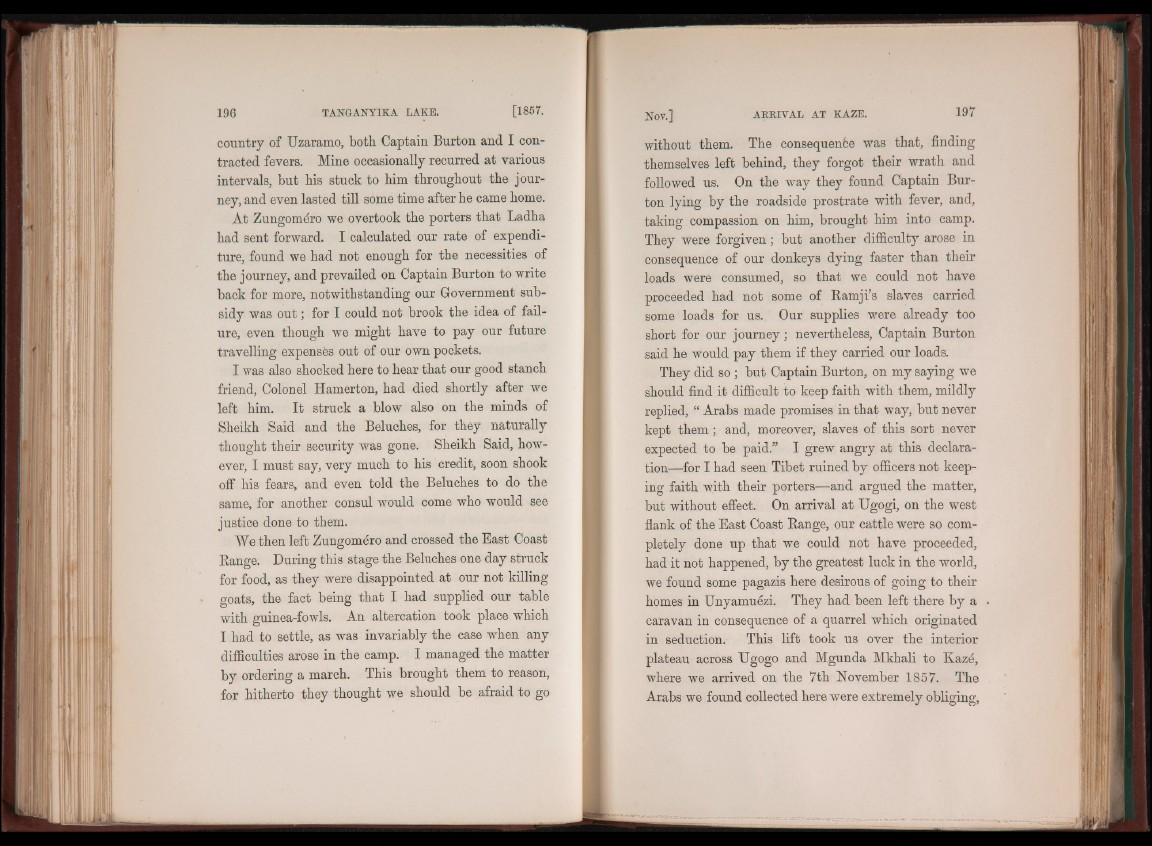
country of Uzaramo, both. Captain Burton and I contracted
fevers. Mine occasionally recurred at various
intervals, but his stuck to him throughout the journey,
and even lasted till some time after he came home.
At Zungonffiro we overtook the porters that Ladha
had sent forward. I calculated our rate of expenditure,
found we had not enough for the necessities of
the journey, and prevailed on Captain Burton to write
back for more, notwithstanding our Government subsidy
was o u t; for I could not brook the idea of failure,
even though we might have to pay our future
travelling expenses out of our own pockets.
I was also shocked here to hear that our good stanch
friend, Colonel Hamerton, had died shortly after we
left him. I t struck a blow also on the minds of
Sheikh Said and the Beluches, for they naturally
thought their security was gone. Sheikh Said, however,
I must say, very much to his credit, soon shook
off his fears, and even told the Beluches to do the
same, for another consul would come who would see
justice done to them.
We then left Zungomero and crossed the East Coast
Bange. During this stage the Beluches one day struck
for food, as they were disappointed at our not killing
goats, the fact being that I had supplied our table
with guinea-fowls. An altercation took place which
I had to settle, as was invariably the case when any
difficulties arose in the camp. I managed the matter
by ordering a march. This brought them to reason,
for hitherto they thought we should be afraid to go
without them. The consequence was that, finding
themselves left behind, they forgot their wrath and
followed us. On the way they found Captain Burton
lying by the roadside prostrate with fever, and,
taking compassion on him, brought him into camp.
They were forgiven; but another difficulty arose in
consequence of our donkeys dying faster than their
loads were consumed, so that we could not have
proceeded had not some of Ramji’s slaves carried
some loads for us. Our supplies were already too
short for our journey; nevertheless, Captain Burton
said he would pay them if they carried our loads.
They did so ; but Captain Burton, on my saying we
should find it difficult to keep faith with them, mildly
replied, “ Arabs made promises in that way, but never
kept th em ; and, moreover, slaves of this sort never
expected to be paid.” I grew angry at this declaration—
for I had seen Tibet ruined by officers not keeping
faith with their porters—and argued the matter,
but without effect. On arrival at Ugogi, on the west
flank of the East Coast Range, our cattle were so completely
done up that we could not have proceeded,
had it not happened, by the greatest luck in the world,
we found some pagazis here desirous of going to their
homes in Unyamuezi. They had been left there by a
caravan in consequence of a quarrel which originated
in seduction. This lift took us over the interior
plateau across TJgogo and Mgunda Mkhali to Kaze,
where we arrived on the 7th November 1857. The
Arabs we found collected here were extremely obliging,